
Most cages marketed for guinea pigs are way too small. Learn how to provide your pig with appropriate room to roam.
Why size matters
Guinea pigs are one of the largest rodents kept as pets and yet their typical cage is only marginally roomier than housing for much smaller pets like hamsters and gerbils. Most guinea pig cages on the market are the same size as the commercial "rabbit cages"(which by the way, are Wayyyyy too small for rabbits. Read our posts about rabbit housing and pens for more info) but have
These pictures here are common examples and should be avoided.
While small animal cages often utilize vertical space to increase living area and encourage climbing, digging and burrowing, guinea pigs rely on floor space.
Ramps and platforms at low heights provide variety, but guinea pigs need room to exercise, even with daily playtime outside of the cage.
Also, our piggie friends are not tunneling creatures like hamsters and therefore cannot climb vertical tube systems, loops and loops of tall climbing stimulation and plastic to mimic the elaborate underground tunnels of hamsters and gerbils in the wild.
Below are some more photos of faulty cages..
For many years, the industry standard has been approximately 2 square feet per guinea pig, but this provides barely enough room for a nest, bathroom area, and food and water. GuineaPigCages.com, a well-respected website for guinea pig owners refers to this cage size as "a glorified litter box."
The website, created by Cavy Spirit Rescue, offers the following guidelines for the ratio of guinea pigs to their cage size:
One guinea pig: 7.5 square feet cage (minimum), but more is better; generally 30" x 36" is a good size.
Two guinea pigs: 7.5 square feet (minimum), but 10.5 square feet is preferred; generally 30" x 50" is a good size.
Three guinea pigs: 10.5 square feet (minimum), but 13 square feet is preferred; generally 30" x 62" is a good size.
Four guinea pigs: 13 square feet (minimum), but more is better; generally 30" x 76" is a good size.
Benefits to your guinea pig
Roomier cages offer many advantages that will be enjoyed by both you and your pig:
- Larger cages are one of the most basic types of enrichment you can provide. Guinea pigs can live 5-7 years and can become bored and depressed without adequate stimulation. Imagine spending your whole life in a walk-in closet. Even with occasional breaks, life would be pretty dreary.
- Adequate room to exercise means that your guinea pigs are less likely to develop medical conditions such as heart disease, diabetes, bumblefoot, and anal impaction.
- With a roomier enclosure, guinea pigs can exercise on their schedule, not yours. Guinea pigs tend to be most active in the morning and evening when it may not be convenient to take them out for playtime.
- Larger digs increase the likelihood of peaceful co-existence among multiple guinea pigs (and since guinea pigs are social animals, they do best when housed together).
- Larger cages are actually easier to clean because they prevent the build-up of waste and allow guinea pigs to separate their bathroom area from other activities.
- With the opportunity to express a wider range of natural behaviors, your guinea pigs will be happier and it will be easier to get to know their personalities.
Benefits of MORE SPACE
Exercise in General
The health benefit of exercise for guinea pigs is significant. Like humans, overweight guinea pigs have a higher tendency toward health problems, including heart disease, diabetes, bladder infections, respiratory problems, bumblefoot, and more.
Adult males can develop a condition called impaction -- a loss of muscle tone in the anal area, causing their droppings to get 'backed up' and require periodic cleaning by their guardians. A large cage with ample room for exercise can help keep your guinea pig toned and fit.
Adult females tend to put on weight in their belly as they get older. It's more difficult to find and diagnose ovarian cysts and other related problems in females when they are overweight.
Exercise on Their Schedule
Not yours. Even if you provide an ample amount of floor time every day, your guinea pigs need to be able to exercise and explore on their own body clocks. Guinea pig activity tends to be an hour "on" and an hour "off." Many are particularly active in the morning and evening -- not necessarily at times that are convenient for you. If they have a large enough cage, they can exercise whenever they choose.
Stimulation
Like people, guinea pigs get bored living in the same old small cage hour after hour, day after day, year after year with nothing much to do. It would be like 'being sent to your room' forever, only your room is the size of a walk-in closet and that becomes your life. You have to entertain yourself, eat, sleep, and 'go to the bathroom' all in that small space -- until you die. Even if you are hauled out and allowed to 'play' with some other species periodically, it's a mind-numbing, dreary existence.
Keeping the Peace
If you have two or more non-breeding or same-sex guinea pigs (as you should, since they are social animals), it helps keep them happy with each other if they have enough room to run and play and to get away from each other when they choose.
Easier to Clean
Believe it or not, a larger cage is much easier to clean and keep clean than the smaller pet store or commercial cages. You can read other people's experiences in the Testimonials and find out more about how to clean the cage on the cleaning page. And an easier to clean cage for you means you'll love your guinea pigs that much more over the years.
More Fun for You
Happy guinea pigs are more entertaining and well-adjusted guinea pigs. Healthy guinea pigs means fewer vet visits, worries, and bills. Easy-to-maintain guinea pigs means a happier relationship with your animals. You'll spend less time cleaning and more time enjoying them and your life, especially knowing they are doing so well and you are doing the right thing by them.
Bed time
Though widely sold as appropriate bedding for small animals, cedar and pine shavings are NOT recommended due to chemicals which they both contain. Instead, buy bedding made from paper. Provide enough bedding so that it is between 2-3 inches deep, so that absorption is maximized. Also make sure you have an area for a guinea pig igloo or grass hut for the cavies to sleep in since piggies like covered sleeping quarters.
Location is key
Once you've selected the right housing for your guinea pigs, you’ll need to determine where in your home they will live. Here are some factors to consider:
Temperature: The ideal temperature range for guinea pigs is approximately 65-75 degrees Fahrenheit. Guinea pig housing should be located away from strong heat sources such as direct sun, wood stoves, fireplaces and heating vents. Guinea pigs cannot sweat when they become too warm and are particularly susceptible to heat stroke.
Don't put your guinea pig’s cage in an unheated room, breezeway, garage or other chilly location. Place the cages in a draft-free area (e.g. away from doors and windows and on an elevated surface).
Guinea pigs don’t do well under humid conditions. Dampness promotes the growth of mold in their hay and bedding and can make guinea pigs more prone to sickness.
This cage is placed by a hot fireplace, and this is not an ideal place to put a guinea pig cage.
Activity level: Guinea pigs enjoy being near family activity and benefit from more attention when they’re easy to see and hear. A family room or living room works well, but make sure your pigs have a place to retreat if they need some quiet time.
Noise: Guinea pigs have very sensitive hearing and their cages should not be placed next to stereos, televisions or other loud noises.
Reasons to avoid the great outdoors
An outdoor hutch was once considered acceptable housing for guinea pigs. But keeping a pet outside robs them of regular interaction with the family. Out of sight, out of mind. But we've come a long way from this thinking, in part because the disadvantages for guinea pigs are so clear.
- Outdoor guinea pigs suffer extremes of weather and temperature
- Outdoor guinea pigs are at risk from predators such as hawks and foxes
- Hutches, which are usually made of wood, can be more difficult to clean and disinfect
- A guinea pig's health often deteriorates quickly once she becomes sick, and illnesses may go undetected without regular handling.


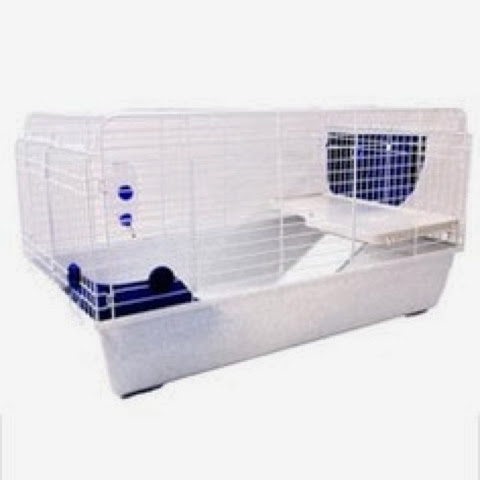
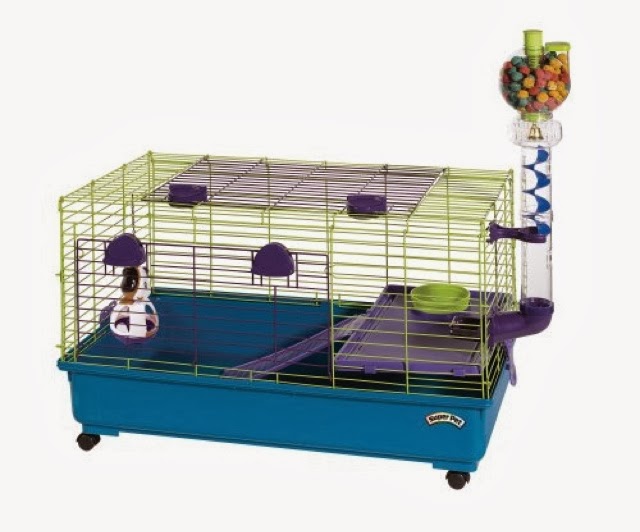
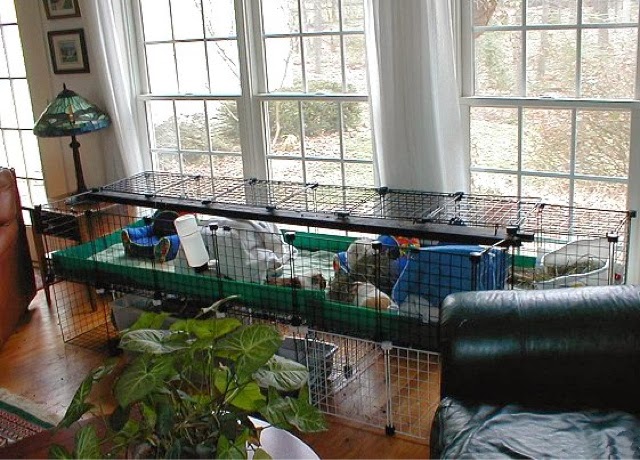
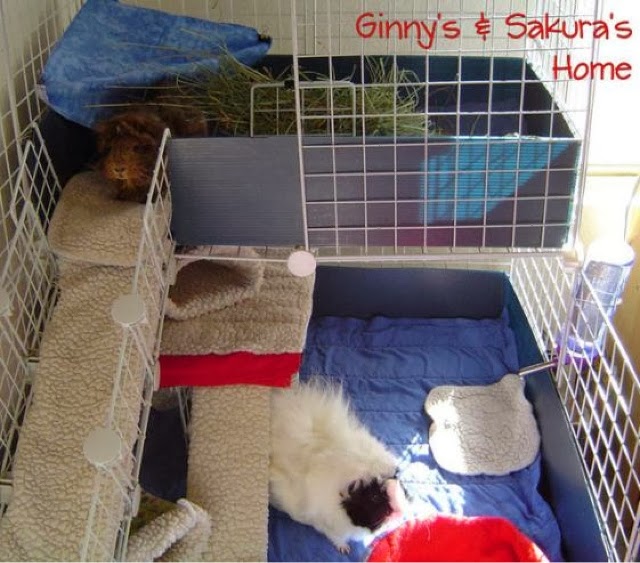

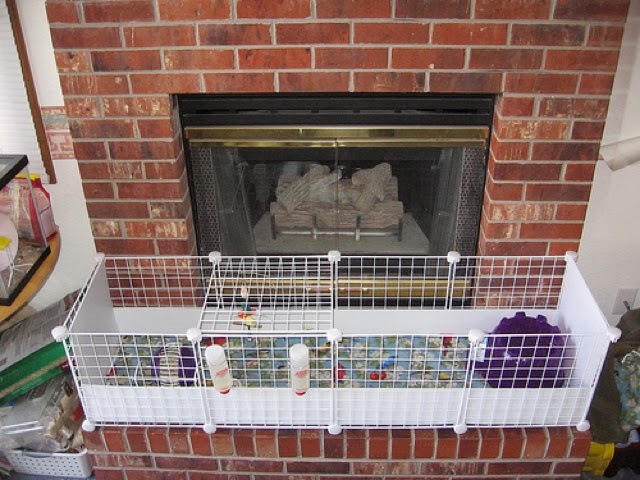
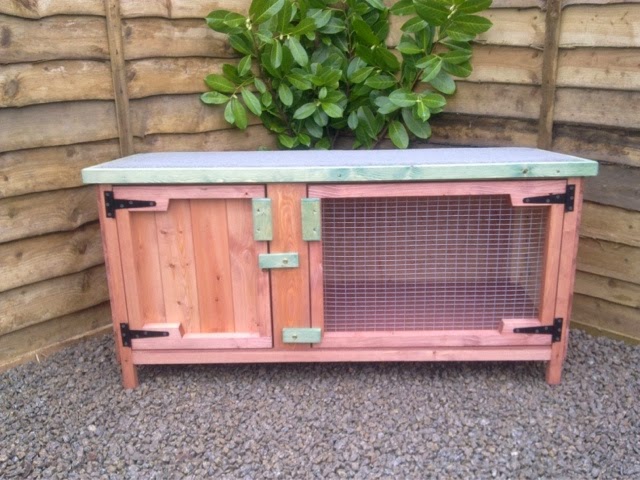
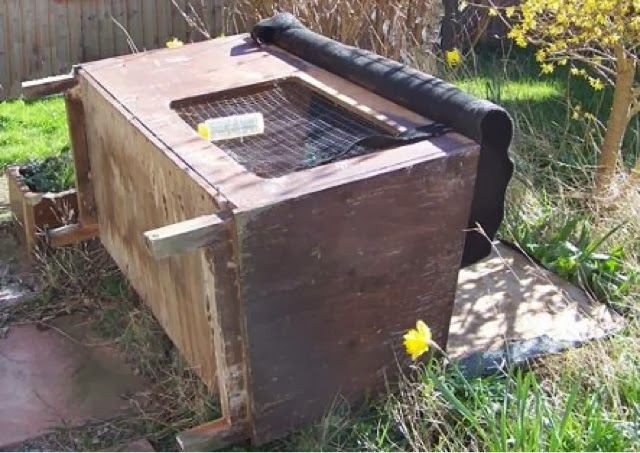

No comments:
Post a Comment
Post a comment here! If you want to post a question visit the tab Ask Us - your question will be answered faster.